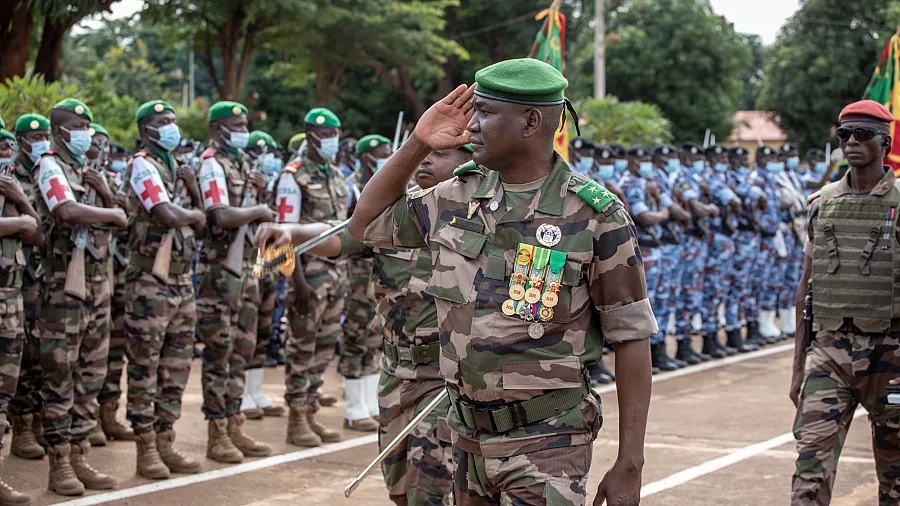In the wake of a string of coordinated assaults across several towns, Mali’s armed forces, on Tuesday, July 2, 2025, launched a powerful counteroffensive, killing 80 fighters linked to the attacks.
This announcement came via a televised statement by army spokesperson Souleymane Dembélé.
He described the military’s response as forceful and effective, highlighting that “the enemy suffered significant losses in every location where they engaged with the security and defence forces.”
The broadcast featured graphic visuals showing the aftermath of the fighting, including the bodies of rebel fighters and a cache of captured weapons, motorbikes, and vehicles.
The attacks were attributed to Jama’at Nusrat al-Islam wal-Muslimin (JNIM), a group affiliated with al-Qaeda.
The group later claimed responsibility for what it called “coordinated and high-quality attacks.”
According to JNIM, the group had temporarily seized control of three military barracks and numerous other defense positions.
The Malian army confirmed that the attacks were carried out in seven separate towns, spanning central and western Mali.
The affected locations included Diboli, a key border town in western Mali near Senegal, as well as Kayes and Sandaré.
Other towns hit were Nioro du Sahel and Gogui, situated northwest of the capital Bamako and close to the Mauritanian border.
In central Mali, Molodo and Niono were also attacked. All these sites came under intense shellfire, according to the military’s account.
These strikes appear to reflect the insurgents’ increasingly sophisticated strategy, which has seen similar operations executed not only in Mali but also in neighboring Burkina Faso.
The ability to launch simultaneous assaults in multiple towns signals a troubling escalation in the group’s operational capabilities.
The ongoing conflict in Mali has deep roots.
Since 2012, the country has battled insurgencies from various armed factions.
This includes jihadist groups linked to both al-Qaeda and the Islamic State (ISIL/ISIS), as well as recurring Tuareg rebellions in the north.
The situation further deteriorated after a military-led coup in 2020, which saw a transitional government installed, followed by another coup in 2021.
These political upheavals have weakened state control and allowed extremist groups to expand their reach, particularly in rural and border areas.
On Tuesday, the violence erupted early in the morning, catching many residents by surprise.
In the city of Kayes, a local resident described waking up to heavy gunfire and seeing smoke rising in the direction of the governor’s residence.
“We woke up in shock this morning.
“There’s gunfire, and from my house I can see smoke billowing towards the governor’s residence,” the witness said, calling the sound of gunfire “intense.”
Another resident shared that they were forced to shelter in place as the confrontation continued outside.
Similar scenes unfolded in other towns.
A political official from Nioro posted on social media that residents there were stunned by the early-morning assault.
The towns of Nioro, Sandaré, and Gogui, all located in the western part of the country near the border with Mauritania, were among those targeted.
The coordinated nature of these attacks has raised alarms about the rebels’ growing boldness and ability to operate across large swaths of territory with minimal resistance.
Though Mali’s military response was decisive in neutralizing dozens of insurgents, the events have heightened fears about the country’s fragile security environment.
The resurgence of major attacks signals that militant groups remain a potent threat despite ongoing efforts by both national forces and international allies to curb their influence.
As Mali continues to grapple with insurgency and political instability, the government faces the urgent task of reinforcing security, especially in border towns and conflict-prone areas.
The coordinated strikes and their swift, lethal response serve as a grim reminder that the battle for control and stability in Mali is far from over.







